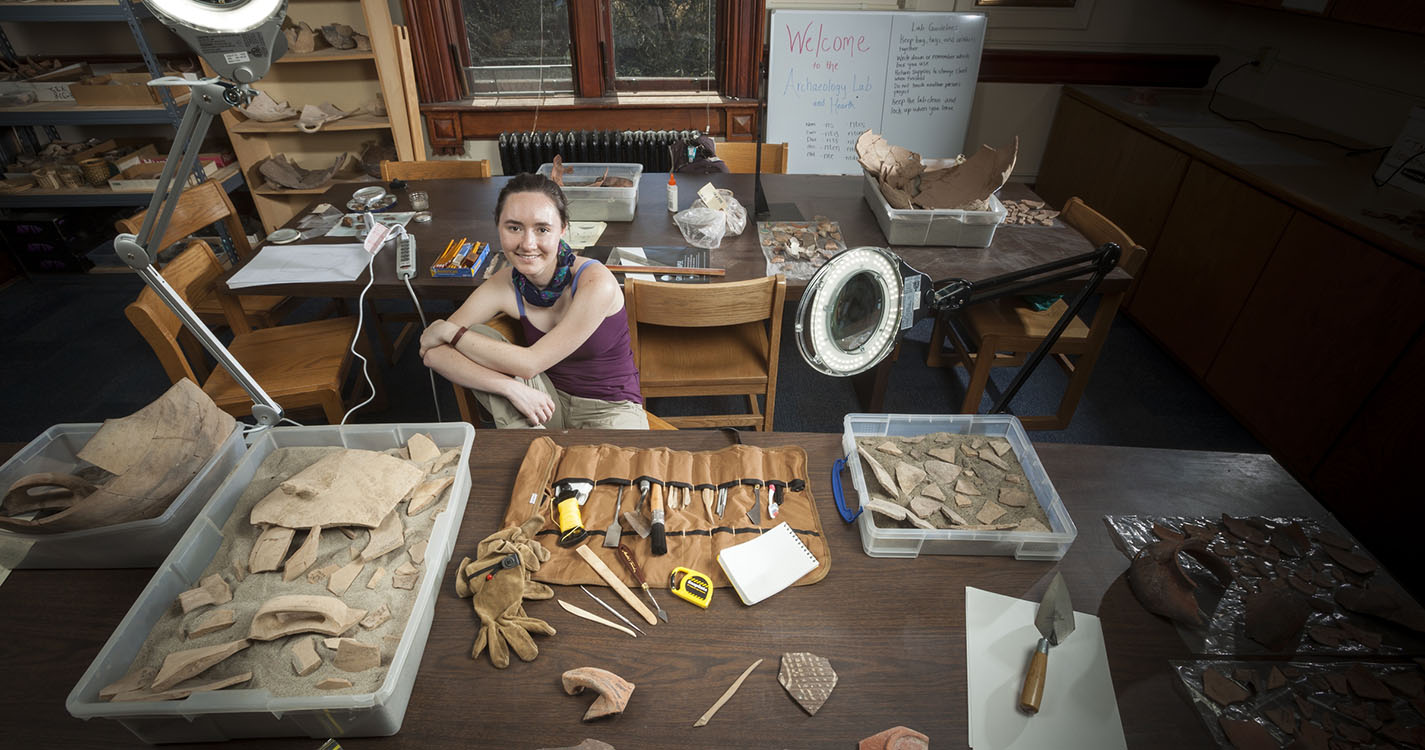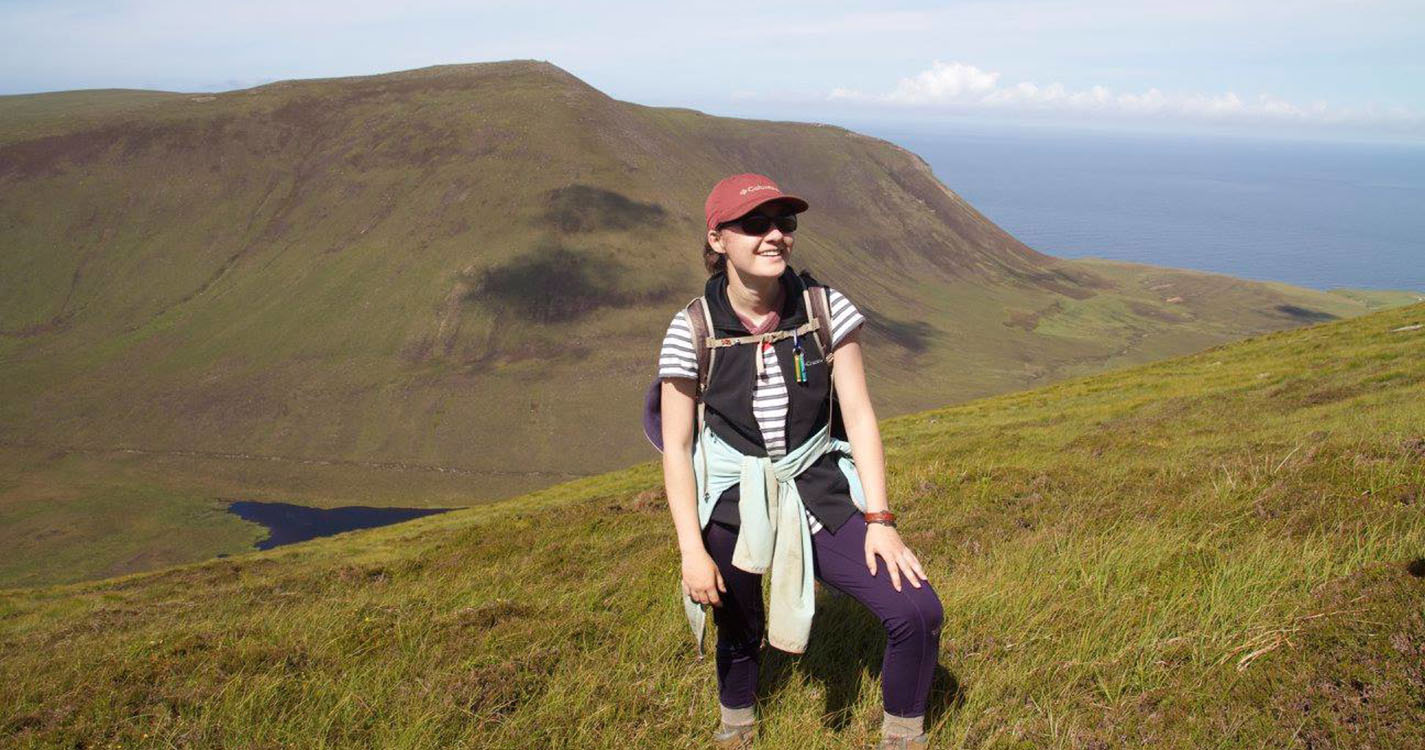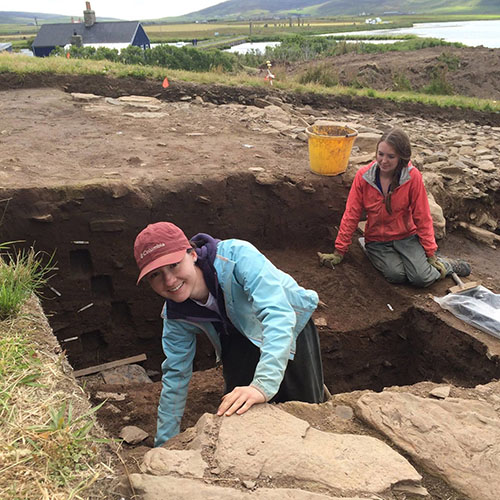Sarah Crabb ’18 stood in a narrow trench, clutching her dirt-encrusted trowel. Wind slapped her face, mud caked her shoes, and puddles multiplied beneath her feet, swallowing everything from pottery fragments to animal bones.
Cold, wet and tired, Crabb was 5,000 miles away from home. She was mired on Scotland’s remote Orkney Islands for four weeks — and she’d never been happier.
“I wasn’t just a shovel slave,” Crabb says about her work with Willamette’s archeology field school. “The field school was dedicated to making this an exceptional learning experience.”
Reopening Stories
Crabb, who’s majoring in art history and archeology and minoring in medieval studies and classical studies, has long been fascinated by ancient civilizations.
That’s why she participated in the Ness of Brodgar Archaeology Field School last summer, serves as treasurer and president-elect in Willamette’s Archeology Club, and works as an office assistant at the Center of Ancient Studies and Archaeology.
Crabb will also travel to Italy in May to participate in two programs. In the first, she’ll restore and analyze historic buildings, while the second will enable her to work in an osteology lab examining ancient human remains and also excavate a Roman villa and baths.
“I love everything that has to do with art and people of the past,” she says. “It’s important to recognize people’s contributions and to reopen their stories.”
On-the-job Training
Crabb discovered the rigors and rewards of fieldwork through her Scotland experience. Through the program, Willamette students work with the Orkney Research Centre for Archaeology and Orkney College-UHI to help unearth an important Neolithic temple complex on the Ness of Brodgar.
Discovered in the early 2000s, the site is more than 5,000 years old — older than Stonehenge. Its collection of buildings includes paved walkways, carved stonework, colored facades and slated roofs. Among the multiple monumental structures unearthed are some of the largest roofed structures built in prehistoric northern Europe.
About 10 percent of the site has been excavated so far, but archaeologists have already learned much about its former inhabitants.
The scale and detail of the structures show residents aimed to awe, maybe even intimidate, outsiders. Prized items like volcanic glass suggest Orkney was on an established trade route, and distinctive-colored pottery shards suggest a popular, grooved style of pottery found throughout Neolithic Britain may have originated in Orkney.
Crabb says even simple things such as food waste, pottery and stone artifacts can impart important information about how societies lived and adapted to their changing world.
“You learn so much about yourself by learning about the past,” she says. “From the food they ate to how they interacted with the environment, these people made changes to benefit their society. Their contributions are something we need to remember and keep alive.”
While in Orkney, Crabb carefully excavated sites and then sieved and sorted the soil in search of artifacts. She gained a newfound appreciation for the meticulous nature of the work.
“You have to take samples, label every single bone and remove them individually,” she says, adding that her most exciting find was an ancient human baby tooth. “Although it was a lot of fun, it wasn’t a vacation or an opportunity to take for granted. It was an actual job to be taken seriously.”
World Explorer
Scott Pike, associate professor of environmental and earth science and archaeology, describes Crabb as “the embodiment of enthusiasm,” with a genuine interest in learning and participating in everything — from lectures and field trips to volunteer excavations and school visits.
He’s witnessed her dedication first hand, both in class and at the Ness of Brodgar site.
“Sarah is eager to turn the page to see what’s next,” he says. “Her perseverance and passion will take her far.”
Looking ahead, Crabb wants to study abroad in either Australia or the Netherlands. She hopes to earn her scuba certification so she can explore maritime archaeology, and she plans to pursue her master’s degree in art restoration.
Although much about her future is uncertain, Crabb is confident of two things. Travel will remain a huge part of her life, and she will put her major to good use.
“I want to impact the lives of people in the modern world by exploring and implementing the lost discoveries and experiences of the past,” she says. “Rediscovering people’s heritage and cultures can help define who we are today.”



